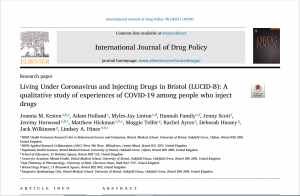How did the COVID-19 pandemic affect people who inject drugs?
28 July 2021
People who inject drugs appreciated the efforts made by drug services to continue to provide support during the pandemic, the National Institute for Health and Care Research (NIHR) funded LUCID-B study published in pre-proof by the International Journal of Drug Policy has found. But for many, the pandemic worsened already precarious and isolated lives.
As the pandemic started, there was concern that people who inject drugs would be disproportionately affected by the virus and the fallout of lockdowns and social distancing. This quote from the study illustrates the difficulties many people who inject drugs experienced: “They say the opposite of addiction is connection but how are you supposed to connect with people when you’re not legally allowed to do that.”
The LUCID-B (Living Under Coronavirus and Injecting Drugs in Bristol) study examined how the pandemic, public health measures such as lockdowns and social distancing, changes to harm reduction services and drug treatment medication (opiate substitutes like methadone) were experienced by people who inject drugs and the impact on their drug use.
The research was conducted by Bristol Drugs Project (BDP), the NIHR Applied Research Collaboration West (ARC West), NIHR Health Protection Research Unit in Behavioural Science and Evaluation and the University of Bath with funding from the Elizabeth Blackwell Institute at the University of Bristol and the Wellcome Trust.
Staff from BDP recruited 28 Bristol-based people who inject drugs for telephone interviews over a three-month period in the summer of 2020, including the first national lockdown.
A key finding was how appreciative people were of the effort services made to continue supporting them during the pandemic. Some of the most positively received changes were the move to collecting drug treatment medication from pharmacies less often and relaxing rules on taking opiate substitutes under supervision. Home delivery of sterile injecting equipment was also welcomed as it was discreet, convenient and overcame difficulties accessing equipment during the lockdown.
However, interviewees also spoke of the challenges of engaging with telephone and online services describing them as “just not the same”. Many people who were street homeless or vulnerably housed did not have a phone or the internet to access services, making local initiatives to provide phones vital.
The government guidance to ‘stay at home’ increased isolation and boredom, negatively affecting mental health. This disruption to daily routines affected people’s income, including job losses and difficulties earning money from street begging.
The pandemic’s impact on drug use is not clear cut. While some people described no change, others shared experiences of considerable increases or decreases in consumption. Experiences of isolation, problems accessing drugs, reduced purity and reduced financial resources all appeared to offer explanations for these changes. Difficulties buying drugs in the pandemic meant some people reported changing to more readily available and cheaper drugs like spice.
Concern about COVID-19 and how closely they followed public health guidance varied. Awareness of public health guidance was good and people were trying to follow the advice. People who were not concerned about COVID-19 talked about not knowing anyone who had the virus and having more pressing issues to deal with, including drug dependence. Others were concerned because they felt at risk of from COVID due to medical issues and difficulties maintaining social distancing with peers and drug dealers. Social distancing was more difficult to do in some situations, such as in crowded hostels, and when buying drugs.
Overall, the COVID-19 pandemic presented significant challenges for people who inject drugs in relation to accessing services and loss of connection and routine. The researchers conclude that people facing the greatest barriers to accessing services remotely at a time of heightened isolation and loss of routine may require tailored, more intensive support.
Dr Lindsey Hines, from the Centre for Academic Mental Health at the University of Bristol, who led the study, said:
“Working in addiction and drug use, it was clear that people who inject drugs were likely to experience a lot of disruption and potentially be much more vulnerable as a result of COVID-19. We are grateful to BDP for their invaluable support, which enabled us to connect rapidly with this population.
“Our findings highlight the importance of tailoring support to people’s needs, including economic, housing and mental health support, and offering outreach to those who can’t access services remotely. At the same time, the changes brought about by the pandemic could present an opportunity to rethink policy and practice.”
Maggie Telfer, Chief Executive of BDP, said:
“As streets and many services emptied, LUCID-B was able to illuminate the real-time experiences of people who inject drugs. It is a fabulous example of research at its best, informing service delivery in unprecedented times.”
Dr Jo Kesten, from NIHR ARC West & NIHR Health Protection Research Unit in Behavioural Science and Evaluation, the lead author of the study, said:
“This study continues our longstanding relationship with BDP. At the start of the pandemic, no one knew what would happen if we made rapid policy and practice changes for people who inject drugs.
“This study helped us learn about the experiences of people who inject drugs during this unprecedented time. Our findings can help inform decision-making about which changes to continue. We particularly hope it will contribute to policy decision-making about drug treatment medication.”
Paper
